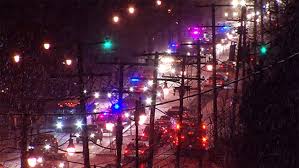 Two nights ago, the corner where my house sits in Arlington was very busy. I was driving around Falls Church and Arlington in the dusting of snow that quickly turned into black ice on the roads. As I tried to reach my house, a neighbor stopped me and the cars surrounding me. There had been a multi-car accident at my intersection which is at the bottom of a hill. I turned around and was able to drive in a large circle around the neighborhood, up and down another hill, in order to get access to my driveway and garage. That night we watched as many cars lost control going down the hill at my corner, jumped the curbs, crashed into each other, knocked over the street sign and the stop sign, and ended up perpendicular to the curb. Drivers abandoned their cars which were left in a haphazard way in front of my house and up the street. A few cars were left in the middle of the intersection. Drivers simply could not drive their cars up or down the hill. I grew up in Buffalo, a city that knows a thing or two about snow removal. When it snows (and we had a lot of Lake-effect snow), a plow comes overnight and plows the driveway. Life goes on during a snowstorm and school is rarely canceled. Buffalo is known as the City of Good Neighbors. Growing up, if you were inside and heard a car spinning its wheels outside stuck on an icy road, you'd hear several front doors slam shut as neighbors ran outside to help a neighbor or a stranger. But here in the D.C. area, life is different. Snow removal is not a budget priority. Roads are not pretreated. People fight over the last loaf of bread on the grocery store shelf. There are few plows. The plows seem to wait a long period of time before they begin the task of clearing snow. The trucks that do eventually show up plow a strip down the center of the road instead of plowing to the curbs. Schools are closed for days. Parking lots are not cleared. We are asked to wait until the sun melts the snow when we express concerns about road and sidewalk conditions days and weeks after a major snow event. Power outages last for days. My family and friends from Western N.Y. do not understand any of this craziness. Last night, I saw a Washington Post article on Facebook that I shared by Petula Dvorak entitled, "Forget ISIS. The most powerful city on earth can’t handle a dusting of snow". Petula describes the night of January 20, 2016 as "a one-inch snowtastrophe involving at least 1,000 accidents, eight-hour commutes and cars abandoned on freeways by desperate, disgusted commuters. Some people hadn’t even made it home by dawn Thursday". I would love to use my mediator training and Buffalo background to work with Arlington County and Northern Virginia leaders and transportation officials to radically change the way we address the issue of snow here in the Mid-Atlantic. The core benefit of mediation is that it empowers the participants to develop solutions to identified issues in a collaborative way. Mediation works in large part because it gives everyone the opportunity to be heard and understood. But, it is difficult to change the culture of our area of Southern efficiency and Northern charm, as JFK described Washington, D.C. For any change to occur, all parties must be willing to start a conversation and come to the table. I have been ready for a revolution in how the greater Washington, D..C. area addresses snow for years! I just wish there was something that I could do to effect such a change.
1 Comment
Sharon Teitelbaum
1/22/2016 05:00:47 pm
I have an idea. Check in when you get a chance.
Reply
Leave a Reply. |
AuthorEllice Halpern, J.D., is a Virginia Supreme Court certified general and family mediator. Archives
June 2024
Categories |
Copyright © 2015 www.littlefallsmediation.com

 RSS Feed
RSS Feed